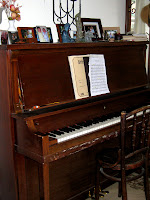I love writing. I especially love blending reality and fiction so the edges blur and you can’t discern one from the other. Traveling Ivory is a fictionalized version of several real life stories woven together. It’s long, but you’ll have two weeks to read it. I’m taking next week off. Be well.
The morning sky pulsed gold, crimson, and umber pierced with shards of sun that glinted off the highly polished cherry wood. AdriAnne loved the way the ivory and ebony keys felt silky under her small fingers. Her span fell short of an octave, but she knew she would grow into it. Diligently, she ran the scales up and down, silently, without pressing on the keys—she made no sound, not while he was home.
The turn of the century Wurlitzer was the family jewel on her father’s side, guarded by Aunt Hazel until her death, upon which it was transferred by will to AdriAnne.
Hazel knew it wouldn’t save the child, but perhaps it would sustain her into adulthood. She firmly believed her brother should be shot, but didn’t know anyone who did that sort of thing. She also believed that what goes around comes around, though she might not live long enough to see the day.
Nine-year-old Adri traveled into the night sky where no one could touch her, transported on the moon-drenched notes of Claire d’Lune.
In the early morning hours after her door clicked shut and the footsteps receded, she would pull herself from bed and, wrapped in the faded quilt, quietly float Somewhere Over The Rainbow, her short legs straining to push the quiet pedal, her fingers dancing over the keys. Indeed, she owed the Wurlitzer, and Aunt Hazel, her life.
As an adolescent, Adri was a good girl. And, like many good girls, she had a soft spot in her heart for bad boys. A therapist later would refer to it as loyalty to the abuser.
She married one in her early twenties—a bad boy, an abuser. When he was good, he was very, very good. She became practiced at intentional evasiveness in the ER. Not very convincing, she supposed, but what can one do.
Can’t Help Lovin’ That Man of Mine, she played the mournful tune repeatedly on the piano, even when he threw the telephone that cracked low C because he couldn’t hear the Raiders game over the quiet torch song. She reconsidered when he slammed the lid down on her fingers because she didn’t look at him when he spoke.
Down on his luck and out of a job, he moved them into a studio apartment across town. No room for that damned piano, he had barked. A backhand to her left cheek convinced her that tears of protest would be futile.
A friend of his would store the piano for her. No need to fuss. He was sorry. She could have it again when things improved, as surely they would. Didn’t she know he was doing this for her, to keep them from going deeper in debt? Didn’t she know how much he loved her? Where was her gratitude?
When unemployment ran out, true to his word, he got a job, and life did improve, mostly because he was gone a lot. Though inconsolable without her piano, Adri managed to keep a cheerful presence in the home. It was convincing if you didn’t look too closely. He had seen to it that there was no one in their life, no one to look too closely.
After a year, they moved again, into a house that was big enough to reclaim that part of her that was as important as her heart. Her spirit soared.
With a shrug, he turned to her after hanging up the phone and reported that a few months ago, his friend had sold the piano to a young couple, cheap, to settle a debt. They had since moved, the house was empty, and the piano was nowhere to be found. What can you do?
He certainly hoped she wasn’t holding him accountable for the actions of his friend, he said in a puffed-up peacock sort of way.
Again, her spirit soared. This time, right on out of her body, and it stayed gone.
As irony would have it, the aforementioned young couple moved just across town into a one-bedroom condo, too small for the cumbersome piano. The day before the move, they called their friend, Laura, and left the following message on her answering machine: “This is your lucky day. The piano you’ve been drooling over, the one with the interesting past, is yours for free if you can find someone to pick it up and move it today!” They grinned at each other as they hung up, knowing the joy they had just bestowed on their friend. What goes around comes around.
Laura cherished the Wurlitzer. She even took lessons and spent hours patiently practicing the scales and working her way through simple children’s songs with glee. She polished the rich, dark wood until it gleamed. She didn’t mind that the “C” key was cracked, and made up a funny story about a mad musician who played with such passion the ivory simply cracked in ecstasy.
As irony would have it, within the year, she was called to the other coast to care for her ailing mother for an indeterminate period. In the bigger picture, it made sense to give up her apartment, put what she could in storage, and take only what she could carry in two suitcases.
Though it broke her heart, parting with her beloved Wurlitzer seemed to be in the stars. The thought of it sitting in cold storage was unbearable. She put a call out to her circle of friends leaving the following message: “This could be your lucky day. My beautiful piano is yours, free, if you can find someone to move it by this weekend. It’s had an interesting past,” she added. “Call me.”
Denise was the first to return her call. She shrieked with excitement. A therapist by profession, she had begun to bloom in her late fifties. Creativity oozed from her pores, her slight body seemed not large enough to contain this sudden growth spurt. She composed songs, picking them out on a tinny-sounding child’s keyboard. A real piano, well, that was heaven sent. She was grateful beyond words.
Laura beamed. She had found her piano a suitable home. What goes around, comes around.
The only available inside wall in Denise’s tiny home, was in the kitchen. She moved the old oak table to the center of the room, and installed the Wurlitzer in its place. The cherry luster gave the room rich warmth, and the melodies that floated from the kitchen enchanted the iridescent hummingbirds outside the window and the Calico on the deck. Denise luxuriated in her good fortune.
On a gray Tuesday morning with a light rain making a stay-at-home day oh, so tempting, Denise tore herself away from the piano, finished her mug of French Roast and headed for her office.
Her ten o’clock client was a referral from a colleague who was closing her practice. The woman had a history of depression and suicide attempts. She was the victim of domestic violence and still lived with the abuser. Denise was not hopeful.
AdriAnne surprised her. She was forthcoming, vulnerable, honest, and insightful. She had a delightful sense of humor, not the self-denigrating kind so many victims hid behind. AdriAnne was a survivor. She was bright, and talented. Denise caught a fragment of a sentence about music being important to her. She asked her to expound, excited by the possibility of finding an interest in common.
AdriAnne told her how music had saved her life through childhood, how her soul drifted in and out of the piano, and how the music wrapped itself around her like the arms of God. She told a tale of misery when her beloved piano was taken from her during her difficult and often abusive marriage, and how her life went quickly down hill as she became isolated in the abuse. Large tears pooled then spilled freely as she spoke of the loss of her piano as a death of her spirit. She confessed she had spent countless years praying to a God she no longer believed in to reconnect her with her beloved, turn of the century, cherry wood Wurlitzer.
No! Denise’s mind balked. It can’t be. The moral dilemma of possibly having in her possession the very instrument that was this woman’s lifeline, twisted something deep inside Denise’s heart.
“I can see this loss has altered the course of your life,” Denise said quietly. She leaned forward, gently attentive, as AdriAnne unfolded her story. Emotionally spent, the young woman sat back, exhausted.
“What do you imagine you would do if you were to find your piano once again?” Denise posed.
AdriAnne straightened her shoulders, took in a deep breath, and with her mind riveted on the question, said, “I would leave my husband and start a new life for myself. I would know I had my spiritual strength back.” She sighed deeply. “But, that will never happen, will it.”
Denise scheduled their next appointment in a week, with a promise to herself to call her colleague for a consult as soon as the woman left.
“What do you think is the right thing to do?” Denise asked after telling the story and her hunch about her unintentional involvement in the woman’s misery. “I mean, if it’s true, should I give her the piano?” she asked as her throat tightened with a sob.
“Is it possible it’s not hers? Are there any identifying marks or anything, before you jump to conclusions and give away your precious piano?” her friend asked.
“I guess I should find out. It’s going to be so awkward to ask,” sighed Denise.
In the days that followed, she devised a plan. She would return the piano to the woman if she knew for sure AdriAnne was the true owner. It would break her heart, but she knew that was the right thing to do.
Denise stepped out of her office and into the waiting room the next week to find a transformed AdriAnne beaming at her.
“Well, tell me, what is responsible for this change I see in you?” Denise smiled as they settled in for their session.
“I’ve given what we talked about some deep thought this week,” AdriAnne said. Her whole demeanor was different. She looked alive and vital, strong and sure. Her eyes were bright, and her skin was luminescent.
“And?” Denise prompted. She was aware of a clench in her stomach.
“And, I realize how I’ve been holding out for the impossible before I felt strong enough to make a change. It will never happen. I need to let go of the past and move on,” she said with commitment.
“What will that look like?” Denise asked, truly curious.
“I’m leaving my husband,” AdriAnne grinned. “I have some money saved up, enough to get a place of my own, and…” she paused dramatically.
“And?”
“And, a piano! I’m going to buy myself a new piano. Can you believe it?” she grinned hugely and clapped with excitement. “No more dragging the past around with me. I don’t have to wait for miracles, I can make them myself,” she said.
Denise was aware she’d been holding her breath, which she released in a whoosh.
“I know, I can hardly believe it either,” AdriAnne said.
“That’s wonderful,” Denise beamed, aware of the truth of that statement on so many levels.
“There is a drawback, though,” AdriAnne said. “I’m not going to be able to do all this and continue therapy. I’m so thankful for all you’ve done in getting me pointed the right direction,” her eyes moistened, “but this will be my last session for now.”
“The door is always open,” Denise said at the end of the session as she hugged AdriAnne goodbye.
“So you don’t know if it was really her piano or not?” her friend asked her over coffee and croissants the next morning.
“Nope. That’s the thing about miracles,” Denise grinned, “they’re hard to explain.”
At home that evening, Denise’s fingers ran gently over the keyboard, randomly touching down to create a soulful sound. As she became conscious of the pattern of notes she was playing, she grabbed a piece of paper and jotted them down.
Over the week that followed, more snippets of tunes presented themselves when her mind came to rest for a moment, as though her brain was full of music just waiting to find a way into expression. Each night, she would scribe the notes onto lined paper, weaving a musical fabric of her day’s musings.
“Seems to be a hobby that’s taken on a life of its own,” she mentioned to Cami, a pianist friend who stopped by to return a book on Monet, the lithographs used as muses for her own musical creations.
“Can I take a look?” Cami asked, and Denise nodded her to the piano bench. Cami ran through the piece, adding chords, embellishments, and flares, her shoulders hunched and her eyes squinted in passionate attention. “I love it,” she declared as she sat back on the bench. “Could I use it in my winter concert?”
“You want to play my song?” Denise asked, aghast. “But, it’s just…”
“It’s just beautiful, is what it is,” Cami smiled. “It makes me think of a young girl, fresh and innocent. What do you call it?”
“I don’t know. Let me think about it,” Denise said, still stunned.
The lights in the Civic Auditorium dimmed and Denise slipped her program under her seat. She shrugged her coat off, nestled it behind her, and settled in for her friend’s performance. She and Cami had grown up together in Missouri in the 50ies. Not children of privilege, but children who believed, against all odds, that they could do anything they wanted if they applied themselves. They’d become each others best advocate and support through childhood and into adulthood.
A ripple of applause turned thunderous as Cami, red hair flashing like fire, golden gown sending sparks of light across the stage, stepped into the spotlight before taking her seat at the grand piano.
The expectant hush as she let her long slender fingers hover just above the keys was broken by the metallic click of a door hinge at the back of the auditorium. The latecomer settled quietly into a seat at the rear as Cami poured herself like molten gold into her first piece. Smooth, liquid, fluid notes blended and lifted first as gently as a gliding butterfly, then as powerfully as a soaring nighthawk.
Denise, with misty eyes, was captivated by the beauty of the music that only a month ago had swept through her own soul to be born on paper.
The latecomer at the back of the auditorium sat with rivulets of tears dampening her cheeks, one hand over her heart as if to keep it from breaking. She had never given herself the gift of a piano concert, had no idea what to expect. How very strange to find herself awash in sadness, fear, and innocent hope, memories of her own childhood wrapping around her, and threatening to squeeze the life out of her as the music filled the auditorium. Spent by waves of devastation, she inhaled the powerful surges of hope as if they were life itself. So overcome with emotion, she was unable to join the audience in a standing ovation.
Cami acknowledged their appreciation and when the din quieted, began her second piece. The latecomer gathered herself as best she could. When her breathing regulated once again, she angled the program so the light from the Exit fell on the title of the piece just finished and read, A Gift for AdriAnne. Her cry was muffled by a crescendo of music that surged through the room.










I loved reading this piece; great story!